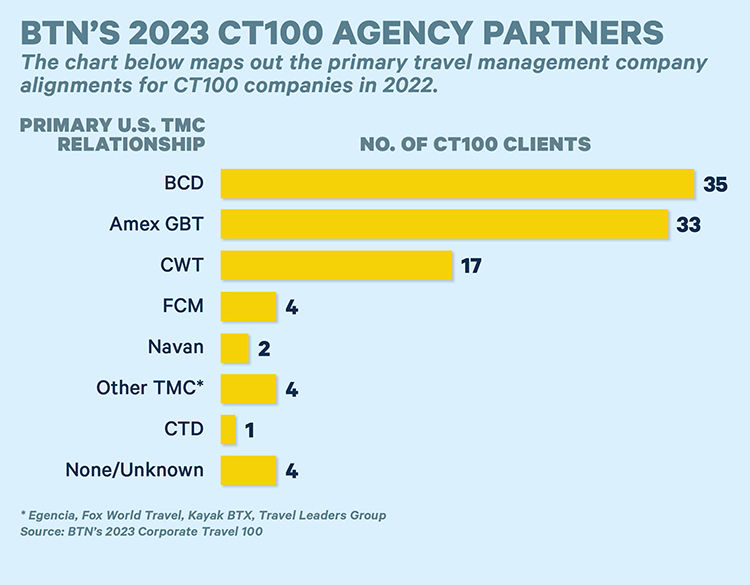 Updated Oct 9, 2023
Updated Oct 9, 2023
Business travel was back on the radar in 2022 for Corporate Travel 100 companies. Among the firms that participated in BTN’s survey and for which, as a result, we have confirmed historic and projected data, 96 percent saw business travel rebound in 2022 from prior-year levels. A precious few reached pre-pandemic levels, but several companies reported eight times their travel spend from 2021, the absolute nadir for the industry due to global travel restrictions implemented during the Covid-19 pandemic. Many companies easily quadrupled their 2021 spend, and 92 percent of the companies that reported their numbers to BTN expect to clock in additional business travel growth in 2023. A handful of these projected to double or triple their 2022 volume as corporates gain confidence heading into the final quarter.
That’s great news for a corporate travel industry that has talked a lot about large enterprises as the “laggards” in the overall travel recovery—dragging behind the surge of pent-up leisure travel and a robust wave of travel from small and midsize companies that grabbed the business travel spotlight in supplier earnings calls over the past 18 months. A number of major business travel suppliers—American Express and American Airlines among them—reconfigured their business travel products and sales approaches to align with the changing opportunity horizon. Others took a note to introduce specialized SME programs to capture that longer tail of the business travel industry.
Not all Corporate Travel 100 companies expect that much upcoming growth. A few expect slight decreases for 2023, but then foresee following that dip with a 2024 return.
Plus, increased spend is not all about increased transactions and trips. It costs more to travel now than it did prior to the pandemic, and companies are feeling that strain on the purse strings. Some companies have addressed the situation with policies that remind travelers to be judicious with travel funds; others, like Microsoft, have created a more formal rubric that encourages “purposeful travel,” taking into account the purpose of the trip, the wear and tear on the traveler and the environmental impact. A couple of companies—like Paramount and Nike—have put pre-trip approvals in place to manage demand.
Notwithstanding, overall business travel demand among the Corporate Travel 100 dramatically increased in 2022 and will continue to do so through 2023 and likely 2024.
Here are some of the major trends running through the programs of BTN’s Corporate Travel 100 companies.
- Sustainability – More than ever, the Corporate Travel 100 companies are dialing into sustainability issues related to business travel. The Science-based Targets Initiative has encouraged companies, especially those that are public, to make clear and science-backed objectives to achieve emissions reductions. The CT100 list this year is full of pledges across industry verticals from companies that are pursuing more sustainable business—and that includes business travel. Regulatory action in Europe has also contributed to this trend, with the gradual rollout of the Corporate Sustainability Reporting Directive that will affect companies far beyond Europe. The Securities and Exchange Commission in the U.S. was scheduled to roll out a reporting requirement this year, but has not yet. Instead, California’s governor just signed a law requiring emissions reporting from business, including business travel. There are other techniques and investments being made in business travel diversity. CT100 companies are contributing avidly to demand stimulus projects for sustainable aviation fuel, as well as efforts to track that the funds and allocations are properly counted. Others have implemented carbon pricing or carbon funding that ultimately goes toward carbon reduction.
- Business Traveler Experience – As another holdover interest from the year before, many companies in the Corporate Travel 100 said their major concern for 2022 and continuing into 2023 was improving the traveler experience. The difference this year is that they aren’t necessarily looking for that singular service help from the TMC. More companies are taking technology solutions the next level to make sure travelers are engaged, supported and have the content they need to make the right decisions for their trips. Check out Deloitte at No. 2, Google at No. 7, PwC at No. 16 or Bloomberg at No. 61 for a taste of the variety of ways companies have devised to enhance the traveler experience, from policy changes that address traveler well-being to accessibility desks for travelers who require additional support.
- Duty of Care – Certainly at the top of many priorities, better traveler engagement leads to more comprehensive duty-of-care measures. Several companies made big changes to increase visibility into their travelers’ bookings and activities. Perhaps the biggest surprise is Google—famous for its “open booking” program since 2009—the company is moving toward a more traditional set-up that offers travelers more support. Other companies enhancing duty of care are No. 9 Lockheed, No. 38 Caterpillar and No. 53 Toyota N. America.
- Internal Meetings – We’ll leave you with a big one that could diminish or grow depending on whether hybrid workplaces become the default position for many of our CT100 companies or if they plan to call employees back to the office 100 percent. But more companies definitely are paying attention to the rise in the percentage of travel attributable to internal meetings. Companies like Amazon, our list leader this year, RTX at No. 10, McKinsey at No. 11, BCG at No. 17, Siemens at No. 19 and Microsoft at No. 37 are looking at technologies, policies and procedures for internal meetings that make up a bigger portion of their travel budgets now.